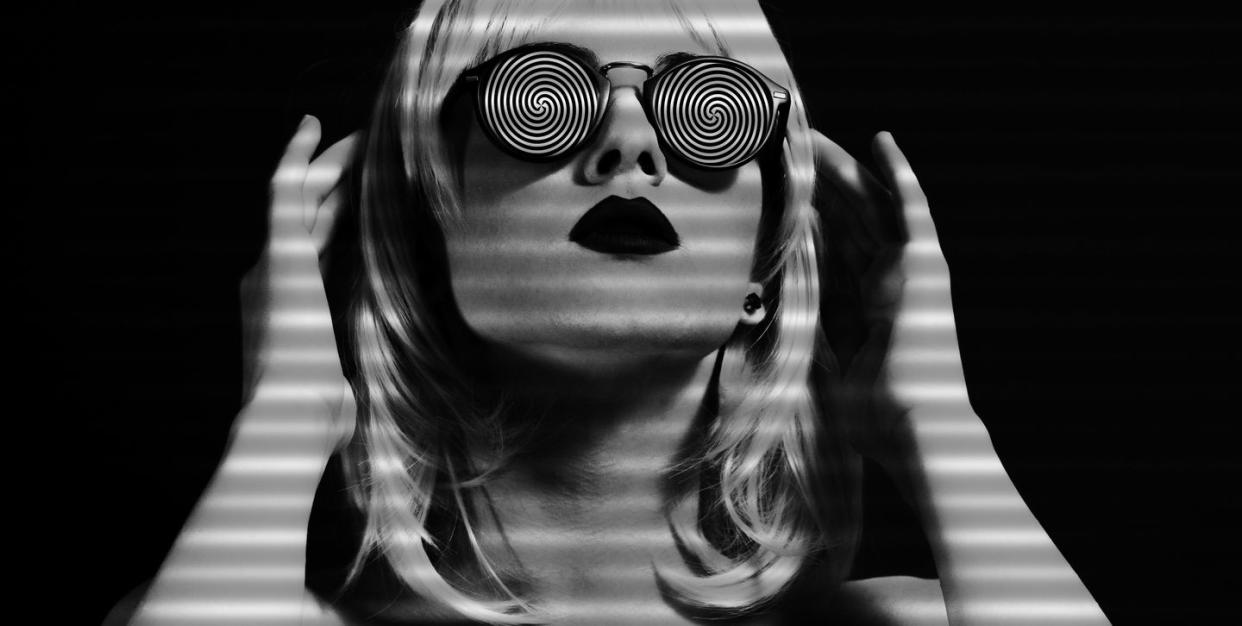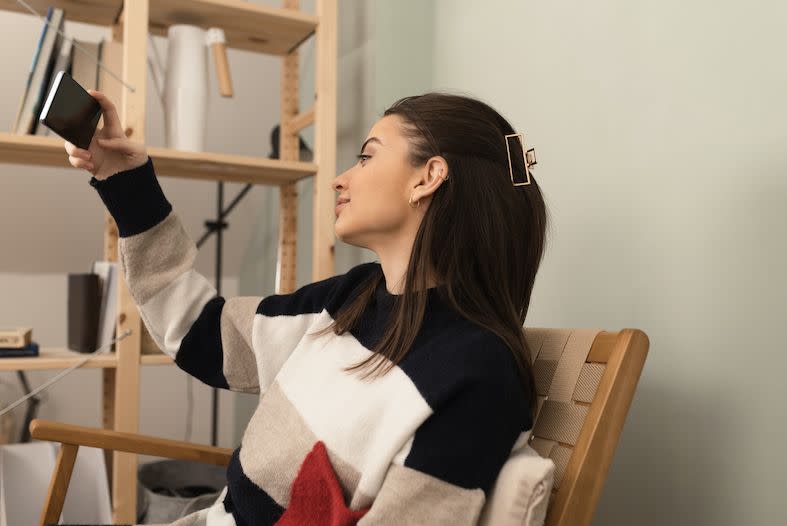I tried digital hypnotherapy... Could it work for you too?

The comforting cadence of my best friend’s cackle bounces around the garden walls and into the valley beyond. I reach for the glass on the table in front of me and take a sip. The rosé is cold, and as it slides down my throat, I feel my shoulders slacken.
We’re in the garden of my parent’s house in Wales - a copy-and-paste holiday my friends and I take once a year. But my subconscious spends more time here than annual leave and adulting allow. And it’s here my mind has travelled this morning while my body remains some 250 miles away, when the man on my laptop screen asks me to go to my ‘happy place’.
What is digital hypnosis?
Hyper-vivid visualisations are just one technique in James Mallison’s arsenal. I first met Mallinson, a hypnotherapist, back in 2019, when he extinguished a fear of public speaking just in time for me to host a series of panel talks. But he’s since moved out of his central London office to treat clients exclusively online - a move that makes him something of an influencer – because digital hypnosis is trending.
Over on TikTok (where else?) #hypnosis has upwards of 1.5 billion views, with users tuning in for videos in which content creators use hypnotherapy techniques to help their followers fall asleep more easily, release feelings of anxiety and feel more confident. So popular is the concept of digital hypnosis that it’s even birthed a spin-off trend; the goal of the meditation technique #realityshifting is to move your subconscious from your current reality (CR) to your desired reality (DR).
"Digital hypnotherapy - using hypnosis in order to treat conditions and change habits - is no different to hypnotherapy delivered in person," Mallinson explains, when I ask him to define the term. "The only differentiating factor between your previous hypnotherapy session and this one is that I’m talking to you via a screen. So in that sense, digital hypnosis is a way of bringing the benefits of hypnotherapy to a wider audience as you can do it from the comfort of your own home."
For many years, those benefits were anecdotal. But the science supporting hypnosis is stacking up. While most of the evidence relates to hypnotherapy and anxiety, along with other stress-related disorders, studies have also shown hypnosis to be an effective treatment for IBS, insomnia and pain.
Can hypnotherapy work for anyone?
Still, if the idea that a stranger can hypnotise you via a screen in a way that enhances your wellbeing triggers a sceptical eyebrow raise, I hear you. But the degree to which hypnotherapy can help you has less to do with the mode of delivery (IRL, via Zoom or via your headphones, in the case of hypnosis apps) and more to do with your 'hypnotisability' - as I learn when Mallinson asks me to look up at the ceiling.
Devised by Herbert Spiegel in 1972, the eye roll test has been shown to predict ‘innate trance capacity’ in up to 80% of cases, with trance capacity measured on a scale of one to four. After I look up at the ceiling, Mallinson instructs me to keep looking up as I slowly close my eyes. If you can keep looking up, all the person looking at you will be able to see are the whites of your eyes; if you can’t, they’ll see your irises as you close them.
I score four out of four; like 15% of the population, I’m ‘extremely hypnotisable’. While not a formal test of ‘hypnotisability’, what the eye roll test does do is let your hypnotherapist know how open to suggestion you might be, meaning they can structure the session accordingly.
What happens in a digital hypnotherapy session?
Mallinson specialises in anxiety, phobias and confidence and it’s the latter that’s brought me to his virtual office door this morning. Or rather, it’s absence. I suspect the return to the office after a prolonged period of wfh had something to do with my self-belief ghosting me. But when pushed for a trigger, I realise my mojo was last seen in March 2020. I’m not alone, either. Some iteration of ‘confidence gone AWOL’ is the presenting problem for one in every two of Mallinson’s clients right now.
Over two 90-minute sessions, we do a bit of what Mallinson calls ‘old school hypnosis’ (sending me off to my happy place while we talk about what’s triggered my confidence crisis) alongside techniques like ‘havening’ – stroking your arms from shoulder to elbow, while reciting the feeling you want to feel.
The techniques are so effective that, just 20 minutes into my first session, I wonder if I need the second. And by the time our three hours are up, I feel like a weight’s been lifted. I don’t feel like my old self, exactly. But I feel like I'm back in the driving seat of my own life.

How does hypnotherapy work?
In an attempt to understand more about a form of therapy that’s helped me, I put in a call to Dr David Spiegel. The Associate Chair of Psychiatry at Stanford University School of Medicine has been studying hypnosis for 45 years, a body of work that makes him one of the foremost hypnosis researchers in the world.
"Hypnosis is a state of highly focused attention, much like the trance you go into when you’re so absorbed in a film that you forget you’re watching it," he says. While you’re in this state, he explains, you’re more susceptible to novel thinking – a kind of cognitive flexibility which was previously called suggestibility.
"Sometimes the narrowing of the attention also allows you to separate out aspects of the way you used to think," he adds. "And by honing in on this view, you can disconnect yourself from unhelpful way of thinking about yourself."
Among the brain changes his studies have observed in participants who are in a hypnotic state is a decrease in activity in the default mode network. "This is the region of the brain associated with self-reflection," he explains. "So if you can disconnect the [negative] things you think about yourself from who you think you are, you’re free to change your perspective." In my case, hypnosis helped me re-write the story I’ve been telling myself on repeat: that Covid killed my confidence.
Is digital hypnosis worth it?
Two sessions left me with the profound sense that something had been returned to me, and the experience served as a valuable reminder of just how powerful a tool it can be.
I can’t vouch for the efficacy of hypnosis via TikTok. But the beauty of booking a hypnotherapy session via Zoom is that it’s interactive. As such, you’ll have the opportunity to explore the roots of the issue you’re trying to resolve. And, by doing so, you’ll have the opportunity to expose some of the stories you’ve been telling yourself – the first step towards re-writing them.
That said, I never felt as though my confidence issue was affecting my day-to-day quality of life and if you're currently experiencing symptoms of a mental health condition that is, it's important to discuss your symptoms with your GP in the first instance. Hypnotherapy is a holistic approach and, as such, it shouldn't be pursued at the expense of medical treatment.
It's important to note too that while digital hypnotherapy appointments can be more affordable than the in-person kind, they can still set you back hundreds of pounds, which is why the new wave of self-hypnosis apps is also worth a mention. Reveri – the self-hypnosis app founded by Dr Spiegal – has become a non-negotiable part of my own morning routine, but others are available, too. A chilled glass of rosé, optional.
This article is not intended to be a substitute for professional medical advice or diagnosis. Always seek the advice of your physician or other qualified health provider with any questions you may have regarding a medical condition.
You Might Also Like

